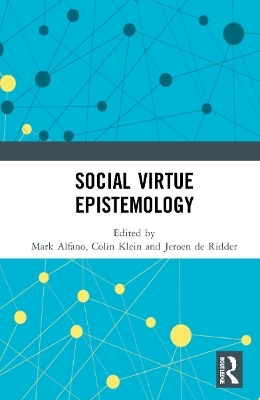
Social Virtue Epistemology
Routledge (Verlag)
978-0-367-40764-3 (ISBN)
This collection of 19 chapters, all appearing in print here for the first time and written by an international team of established and emerging scholars, explores the place of intellectual virtues and vices in a social world. Relevant virtues include open-mindedness, curiosity, intellectual courage, diligence in inquiry, and the like. Relevant vices include dogmatism, need for immediate certainty, and gullibility and the like.
The chapters are divided into four key sections: Foundational Issues; Individual Virtues; Collective Virtues; and Methods and Measurements. And the chapters explore the most salient questions in this areas of research, including: How are individual intellectual virtues and vices affected by their social contexts? Does being in touch with other open-minded people make us more open-minded? Conversely, does connection to other dogmatic people make us more dogmatic? Can groups possess virtues and vices distinct from those of their members? For instance, could a group of dogmatic individuals operate in an open-minded way despite the vices of its members?
Each chapter receives commentary from two other authors in the volume, and each original author then replies to these commentaries. Together, the authors form part of a collective conversation about how we can know about what we know. In so doing, they not only theorize but enact social virtue epistemology.
Mark Alfano is Associate Professor of Philosophy at Macquarie University. In 2019, he published Nietzsche’s Moral Psychology (Cambridge UP). His papers have won awards from the Philosopher’s Annual (2018) and Peritia (2019). Colin Klein is Professor of Philosophy at the Australian National University. He is the author of What the Body Commands: The Imperative Theory of Pain (MIT Press, 2015). Jeroen de Ridder is Associate Professor of Philosophy at Vrije Universiteit Amsterdam and Professor by special appointment of Christian Philosophy at the University of Groningen. His research is in social and political epistemology, and in 2021 he co-edited The Routledge Handbook of Political Epistemology.
1. Interactionism, Debiasing, and the Division of Epistemic Labour, 2. Attunement: On the Cognitive Virtues of Attention, 3. From vice epistemology to critical character epistemology, 4. Narrowing the Scope of Virtue Epistemology
| Erscheinungsdatum | 11.07.2022 |
|---|---|
| Zusatzinfo | 23 Line drawings, black and white; 3 Halftones, black and white; 26 Illustrations, black and white |
| Verlagsort | London |
| Sprache | englisch |
| Maße | 152 x 229 mm |
| Gewicht | 984 g |
| Themenwelt | Geisteswissenschaften ► Philosophie ► Erkenntnistheorie / Wissenschaftstheorie |
| Geisteswissenschaften ► Philosophie ► Ethik | |
| ISBN-10 | 0-367-40764-7 / 0367407647 |
| ISBN-13 | 978-0-367-40764-3 / 9780367407643 |
| Zustand | Neuware |
| Haben Sie eine Frage zum Produkt? |
aus dem Bereich


![Was heißt Denken?. Vorlesung Wintersemester 1951/52. [Was bedeutet das alles?] - Martin Heidegger](/media/113619842)